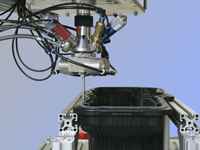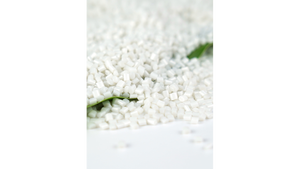With new silicone, no need for rubber gaskets on oil pans, cylinder heads, and more
Chemicals and silicone supplier Wacker, in collaboration with the "society for innovation" (INPRO)—a joint venture of BASF, Daimler, Siemens, ThyssenKrupp, Volkswagen, and the state government of Berlin, Germany—has developed a new silicone rubber specifically designed to meet tough automotive-industry demands. Testing shows this sealant can be applied in, for instance, oil pans, cylinder-head covers, and oil separators, and can replace the solid rubber gaskets usually inserted in these underhood systems, often at great trouble.
January 28, 2010
Chemicals and silicone supplier Wacker, in collaboration with the "society for innovation" (INPRO)—a joint venture of BASF, Daimler, Siemens, ThyssenKrupp, Volkswagen, and the state government of Berlin, Germany—has developed a new silicone rubber specifically designed to meet tough automotive-industry demands. Testing shows this sealant can be applied in, for instance, oil pans, cylinder-head covers, and oil separators, and can replace the solid rubber gaskets usually inserted in these underhood systems, often at great trouble.
|
|
Gaskets are a perpetual problem in many automotive applications. Carmakers would love to automate their insertion, but oftentimes have to rely on manual labor to ensure a seal is perfect. Knowing that history, the new solution from Wacker and the Inpro team could find traction quickly in the automotive industry. Inpro was formed to help speed automotive R&D from academia to commercial use.
One two-component system proposed relies on Wacker's liquid silicone grade Elastosil 76540 A/B and Ultramid A3HG7 Q17, a 35% glass-fiber-reinforced polyamide 6/6 supplied by BASF. The adhesion between the materials survived all common testing conditions. Testing completed at Inpro revealed that no other adhesive/plastic combination exhibits such a high level of adhesion when sealing against aluminum. The Elastosil grade also adheres well to metals and other plastics, however. The tests included storage in oil and in a blowby medium (a condensate found in the crankcase of gasoline engines), and thermal shock tests between temperatures of -40ºC to 150°C.
The two-component RTV silicone adhesive provides a seal over the entire service life of the engine, so that the solid gasket can be dispensed with and the number of screw joints reduced. According to the developers, this could translate into cost savings of 20-25% per oil pan. Moreover, the flange geometry is free of stresses, since no compressive forces are needed for forming the vulcanizable sealant.
Wacker adds that the material can be easily applied with a machine, as shown in this photo, and cures at room temperature. —Matt Defosse
About the Author(s)
You May Also Like



